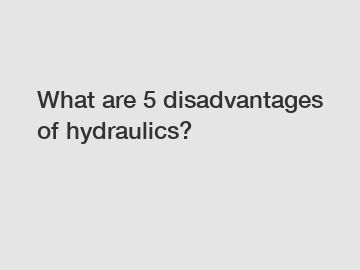What are 5 disadvantages of hydraulics?
What are 5 disadvantages of hydraulics?
Hydraulics are widely used in various industries for their ability to generate massive amounts of force and power. This technology utilizes the properties of fluids to transmit energy and is known for its efficiency and precision. However, like any system, hydraulics also have their drawbacks. In this article, we will explore five disadvantages of hydraulics and how they can impact different applications.
1. Leakage and Fluid Contamination.

One significant disadvantage of hydraulics is the potential for leakage and fluid contamination. Hydraulic systems rely on seals and fittings to maintain the integrity of the fluid circuit. Over time, these seals can wear out or become damaged, leading to fluid leaks. Additionally, external contaminants such as dirt, dust, or moisture can enter the system, affecting the performance and reliability of hydraulic components. Fluid leaks and contamination can result in reduced efficiency, increased maintenance costs, and even system failure.
2. High Maintenance Requirements.
Hydraulic systems require regular maintenance and servicing to ensure proper functioning. The complexity of the system and the need for precision maintenance can make it time-consuming and costly. Maintenance tasks typically include checking and replacing seals, filters, and fluids, inspecting valves and pumps for wear, and testing the system for leaks. Neglecting maintenance can lead to decreased system efficiency, increased downtime, and potential safety hazards.
3. Temperature Sensitivity.
The performance of hydraulic systems can be significantly affected by temperature variations. Changes in temperature can result in the expansion or contraction of fluids, which affects their viscosity and overall system performance. Excessively high temperatures can lead to fluid breakdown and reduced lubricating properties, increasing the chances of system failure. Conversely, extremely low temperatures can cause fluid thickening, resulting in decreased system responsiveness and potential damage to components.
4. Noise and Vibrations.
Another drawback of hydraulic systems is the generation of noise and vibrations during operation. The high-pressure fluid flow, along with the movement of mechanical components such as valves and pumps, can create significant noise levels, which can be bothersome for operators and surrounding workers. Excessive vibrations can also lead to increased wear and tear on system components and structures, potentially compromising their longevity and performance.
5. Environmental Impact.
Hydraulic systems often require the use of hydraulic fluids, which can have a negative impact on the environment. Traditional hydraulic fluids are typically petroleum-based and can pose a risk of contamination if they leak or are not disposed of properly. In recent years, efforts have been made to develop biodegradable and environmentally friendly hydraulic fluids, but their availability and compatibility with existing systems may be limited.
While hydraulic systems offer numerous advantages, it is crucial to consider these disadvantages when selecting and implementing them in various applications. Understanding the potential drawbacks enables engineers and users to make informed decisions, taking into account factors such as maintenance costs, environmental impact, and system performance.
If you have any further questions or require assistance with hydraulic systems, please do not hesitate to contact us. Our team of experts is dedicated to providing reliable solutions tailored to your specific needs.
Contact us to discuss your requirements of customized dual action hydraulic cylinder manufacturer, Metallurgical Custom Hydraulic Cylinder Supplier in China, Wind Tunnel Hydraulic Cylinders Factory. Our experienced sales team can help you identify the options that best suit your needs.


